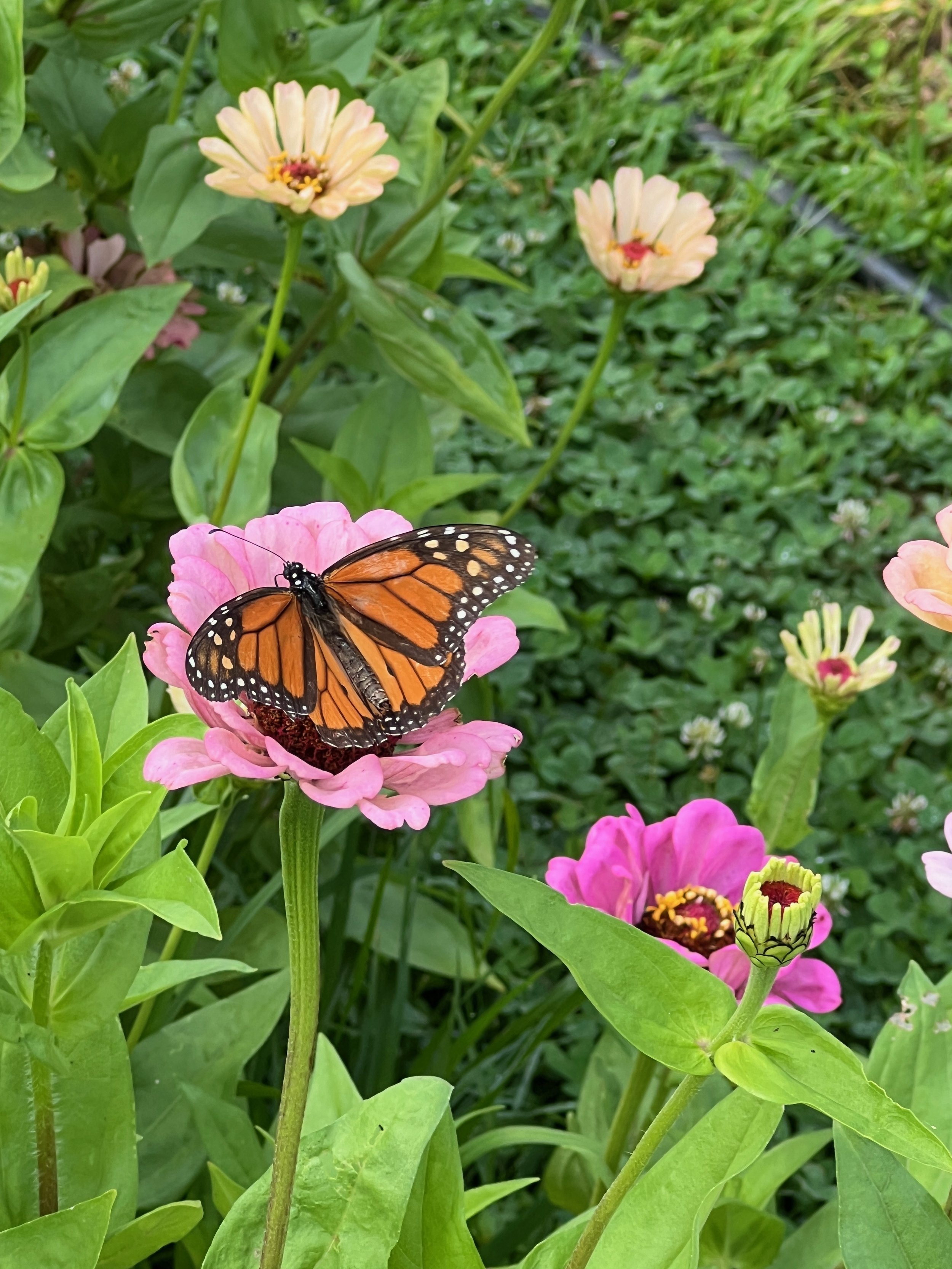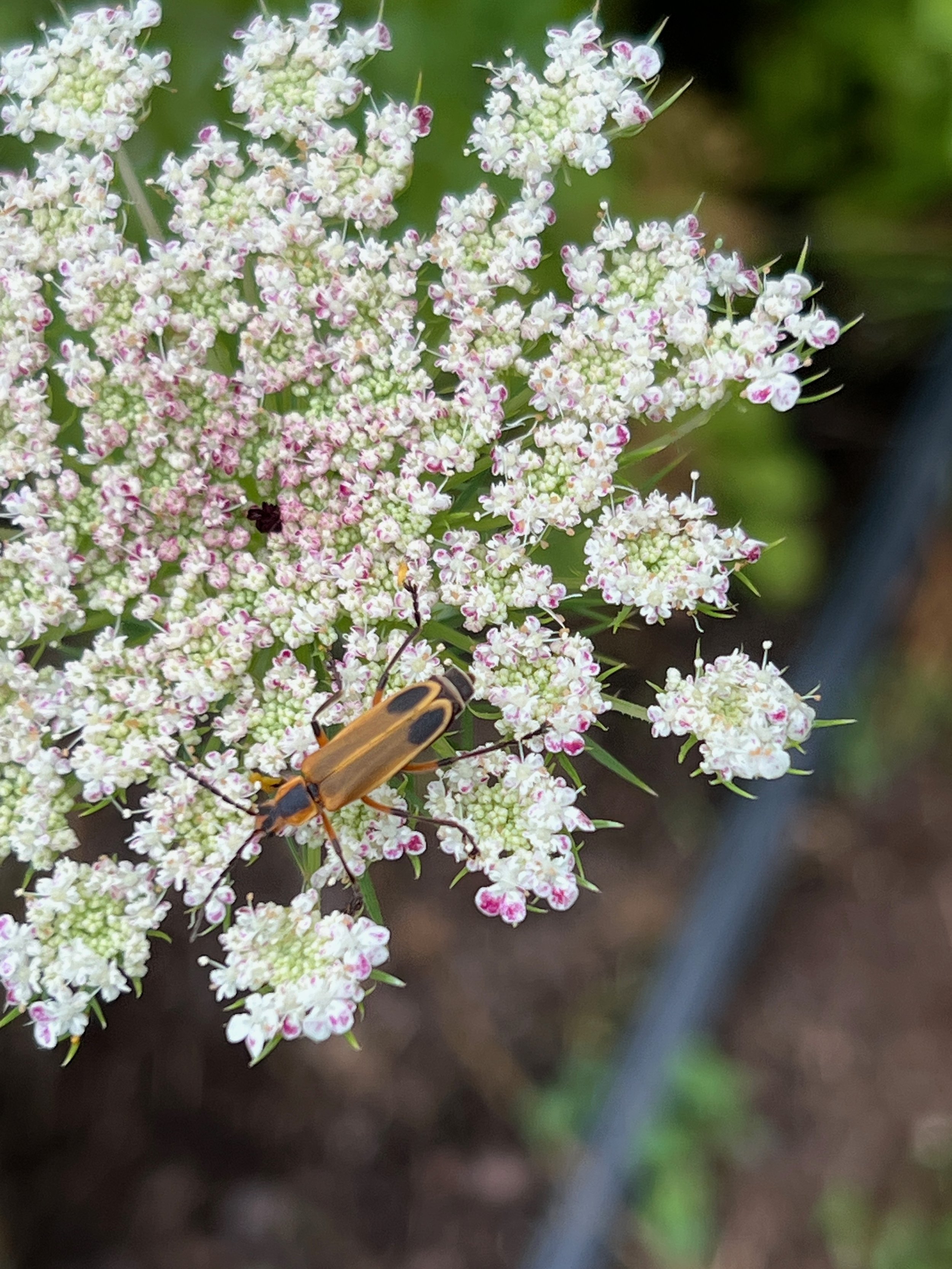Thank You Lightning Bugs
“It’s almost impossible to think about nature without thinking about time.” Verlyn Klinkenborg, The Rural Life
Monarch on a Zinnia
It’s been awhile since I’ve pulled together a farm update. Sometimes I wonder if it is too hot to think. It’s definitely been a busy season–too busy to accomplish everything in the early morning and late afternoon so I’ve spent a lot of hours in the heat.
That’s one of the reasons I have not managed to write an update, but another is that I’ve been a witness to a lot of loss lately. Big, catastrophic, unimaginable losses, like my friend’s loss of her teenage daughter, and other losses that you expect you might encounter in life, like the loss of good health or the death of a treasured and beloved pet. These haven’t been “my” losses, and yet being a witness to loss has its own measure of challenge. It has also left me with this nagging sense that getting older means accumulating losses.
I know, I know, I’m aware that it is a privilege to be alive even while experiencing loss, but somehow I don’t find that very soothing. Watching loss leaves me obsessing over the best way to help, wondering why the world feels so cruel, and trying to figure out how I will weather loss when it comes my way again. Loss has felt like a bit of a theme the last few years, and I’ve struggled with how to process that.
Getting older means collecting losses, carrying more gaps, surviving more holes, and harboring more empty places. I guess if you are lucky it also means collecting more coping strategies.
Daytime Lightning bug on Dara
I think about it a lot when I’m working in the field, looking around and noticing what is there. This season I’ve noticed a lot of lightning bugs. (Maybe more commonly known as fireflies to those who grew up further north than I did!) This specific and very small observation has sometimes comforted me, despite a challenging summer.
July was a tough month flower-wise. My summer flowers got a slow start. My harvesting knowledge didn’t match the high needs of a very hot, very dry summer, and the total absence of rain has started to feel like a personal insult. Despite these difficulties, the life in the field has been abundant. The pollinators and birds have been thriving. The lightning bugs have brought me a particular joy. When I was a child they were abundant in my small backyard. My sister and I spent many evenings after dinner catching them and letting them go. Then I spent many years without lightning bugs in my life, except perhaps to notice them on a camping trip, or on a visit to my childhood home.
A recent Zinnia harvest.
This year I was lucky enough to remember the special magic they create. They are in my field, near our ephemeral pond, and I see them during the day on my umbel flowers. I learned recently that in the larval stage they eat aphids. Welcome news to a flower farmer!
I’m not sure how the return of lightning bugs to my life helps to counter the sadness I feel while witnessing so much loss, but they give me a spark of joy when I see them hovering just above the grass, intermittently lighting up, then dimming.
Maybe it is because their purpose is so simple and true–to exist, for a short moment, to reproduce, and to keep the earth diversified and beautiful with their presence. The magic they create at dusk is not for my benefit, yet it mesmerizes me. It reminds me of a childhood I treasure, and reminds me that the natural world still persists despite all the ways we have damaged it.
Those gleaming, fleeting lights in the evening sky don’t fill those accumulating gaps, but they do bring me solace and a moment to reconnect with the wonder that, if only briefly, squeezes out some of the worry and ache.
If you want more lightning bugs in your life, there are a few easy things to do:
1. Turn off outside lights at night
2. Don’t use any chemicals in your yard
3. Leave places with fallen leaves in your yard
For more habitat-building suggestions, check out these two links:
Creating Firefly habitat from Garden for Wildlife
How to help protect Fireflies from the Xerces Society



